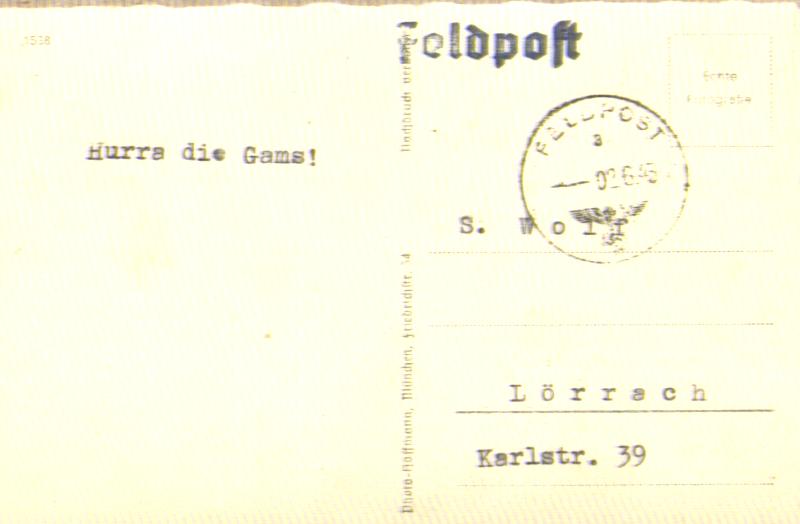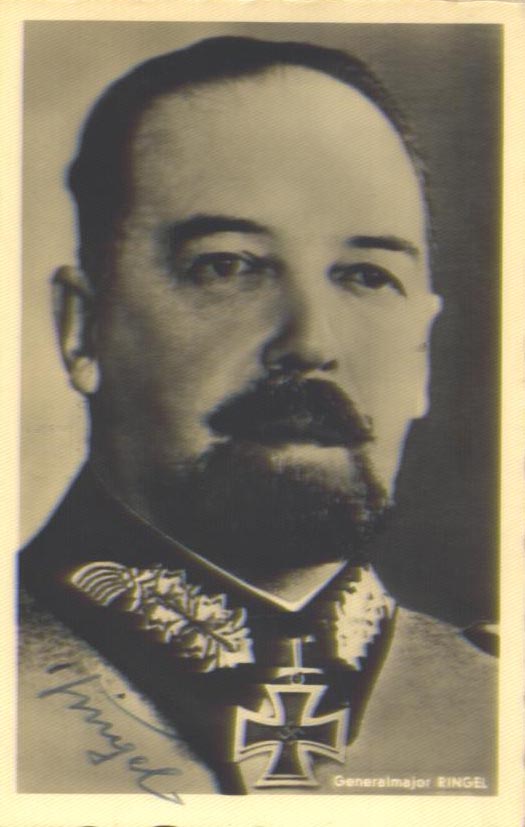

|
RINGEL Juluis
General der Gebirgstruppe
Ringel, Julius
* 16.11.1889 Völkermarkt/Kärnten/Österreich
+ 10.02.1967 Bayerisch-Gmain/Bayern
Awarded Knights Cross: 13.06.1941
as: Generalmajor Kommandeur 5.GebDiv
Awarded Oakleaves as the 312th Recipient: 25.10.1943 as Generalleutnant
Kommandeur 5.GebDiv
Wartime signed Hoffmann card Feldpost stamped 04.6.43 appears to have been sent to him by a collector as it is stamped and self addressed. Removed from book as remains of page glued to reverse. Creases to top and bottom right corners. Nice honest wartime signed piece.
Julius Ringel was born in Völkermarkt in the Austrian state of Carinthia. In 1905 he was admitted to a military school in Vienna, graduating on 18 August 1909. Following his education Fähnrich Ringel was assigned to the k.u.k. Landwehr Infanterie-Regiment 4 (a mountain infantry unit) and a year later, he was promoted to Leutnant. At the outbreak of World War I, Ringel served with Gebirgs-Schützen-Regiment 2 participating in the operations in Galicia and the Italian Alps where he was taken a prisoner of war in 1918. Upon his return to the newly formed Republic of German Austria, Ringel fought against the troops of the Kingdom of Serbs, Croats and Slovenes occupying his native Carinthia. Following the Carinthian Plebiscite and the creation of the First Austrian Republic, Ringel was transferred to the Austrian Federal Army where he rose to the rank of Major in 1930 and became Lieutenant Colonel in 1932. Two years later he was assigned to the 5th Gebirgsjäger-Brigade.
As a supporter of the Nazi Party, Ringel strongly encouraged the union of Austria with the German Reich and after the Anschluss enthusiastically joined the Wehrmacht with the 3. Gebirgs-Division. [1] On 1 February 1939, Ringel was promoted to a full colonel and became the commander of the Infanterie-Regiments 74. When the war began, he was then assigned to the 268. Infanterie-Division and on 27 October 1939 he took over as a commander of Infanterie-Regiments 266, which he led during the campaign in the West.
On 7 June 1940, Ringel returned back the 3. Gebirgs-Division, becoming its commander on 14 July 1940. He led the division until the end of October, when he was promoted to Major General and received a new assignment; as a commander of the newly established 5. Gebirgs-Division. The division saw its first action in the spring of 1941 in the Balkans Campaign, operations code name Marita and Merkur. Following the operations in Greece, the division distinguished itself on Crete, where it took part in the battles to secure the island from the British. For his outstanding leadership during these operations Ringel was awarded the prestigious Ritterkreuz on 13 June 1941.
In November 1941, Ringel’s division was posted back to Germany for rest and refitting. However, only four months later it was sent back to action on the Eastern front. Ringel commanded the 3. Gebirgs-Division through the operations southwest of Leningrad, where it played a major role in the defeat of the Volkhov Front; an achievement for which Julius Ringel was promoted to Lieutenant General and in October 1943 also received the Eichenlaub to his Knight’s Cross. After nearly two years in Russia, Ringel was ordered to move his Division to Italy and in December 1943 it arrived on the Gustav Line near the town of Cassino. He stayed in Italy for another four months, before he received a new assignment and became a commander of the LXIX Armeekorps in Croatia. In June, Ringel was once again promoted to the full General of the mountain troops and put in charge of the Military District Salzburg (Wehrkreis XVIII (Salzburg)) from which the Korps Ringel were formed. He held this appointment until the war's end.
From Wikipedia, the free encyclopedia
Price: $150.00
Please contact us before ordering to confirm availability and shipping costs.
Buy now with your credit card
other ways to buy
|


